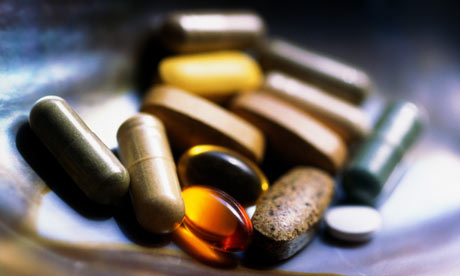
'Rich in antioxidants" is an advertiser's dream slogan. It ensures food and drinks are snapped up in the hope of preventing ageing, cancer or heart disease. Last year, 22 million of us took a supplement and 13% of supplements sold in the UK boasted on the label that they contained antioxidants. Antioxidants, such as vitamins A, C and E, are marketed as good for our health but what is the evidence?
The antioxidant story started more than 40 years ago when scientists discovered that chemicals called Reactive Oxygen Species (ROS) react with components of our cells causing damage, sometimes irreversible. This process is called oxidative stress. ROS refer to any chemical that damages the cell by causing this stress. The "damaging free radicals" you hear about are one kind. Unfortunately, ROS are not avoidable; they are chemicals continually produced within our cells that generate the energy we need to stay alive. So cells also contain a battery of defences to protect us against oxidative stress.
Our cells run into trouble when these defences are overwhelmed, for example when we encounter large amounts of ROS; then oxidative stress is associated with heart disease, cancer and ageing. These insurmountable quantities of ROS may be from the environment, for example from cigarette smoke, or pollution, or they may be produced by our own bodies when we're sick.
Recognition that ROS cause disease was the first step towards our fascination with antioxidants; the substances that mop up ROS. Barry Halliwell, a professor of biochemistry at Singapore University and a world expert in free radicals, says that when research started in the mid-1990s it showed "diets rich in plants were associated with lower risk of developing many age-related diseases and most people would have better health if they ate more fruits and vegetables". Plants contain large amounts of antioxidants to protect them against the ROS they produce during photosynthesis, so scientists concluded fruit and veg were beneficial for us because they contained antioxidants. After this, it was assumed that taking antioxidants in the form of vitamin pills would help prevent disease. "The assumption often was that free radicals cause diseases, and antioxidants will prevent and/or cure them," says Halliwell.
The media then picked up the antioxidant baton, and marketing firms began promoting "anti-oxidant" vitamins and skin creams, and rebranding antioxidant-rich foods as "superfoods".
Unfortunately, matters weren't that simple. Although studies had shown the link between eating fruit and veg and a lower risk of disease, randomised controlled trials - where one group given antioxidant vitamins were compared with a similar group given a placebo - were needed to prove antioxidants actually worked. These trials involved thousands of patients. Although a small number showed antioxidants can be beneficial in diseases such as macular degeneration, the findings on antioxidants and diseases such as cancer, heart disease and strokes have been shocking. A paper combining the results of all previous studies showed antioxidant vitamins were not beneficial, and some even made diseases worse. In particular, giving Beta-carotene supplements, which our bodies turn into vitamin A, to smokers probably increased the risk of lung cancer.
But, despite the fact that antioxidant vitamin supplements are of no value or may even increase death rates, because the marketing industry is in full stride, the best evidence has passed unnoticed.
Another twist is that new research shows small amounts of oxidative stress can actually protect our cells. Dr Toren Finkel, who studies ROS for the National Institute of Health in the US, says, "While ROS have for many years been viewed as purely destructive, the cell can also harness these molecules for useful purposes. These observations complicate the blanket use of antioxidants because, while inhibiting the destructive effects of ROS might be good, inhibiting the beneficial effects of free radicals might have unintended consequences."
Professor Trey Ideker at the University of California, San Diego, has shown that ROS may trigger hormesis, where exposure to a small amount of a detrimental substance elicits protection against later doses. Ideker says it's rather like when a mild amount of sun every day gives you a healthy tan, which then helps you from getting burned later. In his experiment, exposure of yeast to a small amount of oxidative stress activated a gene that led to the cell stopping more free radicals entering.
His next step is to identify similar pathways in human cells. This research may allow the development of drugs to prevent damaging amounts of ROS entering cells. However, he is cautious at this early stage: "If the pathway works along similar lines in humans and if it can be manipulated as in yeast, then one can imagine very useful therapeutic possibilities relating to cancer and ageing."
So, if taking antioxidants doesn't work and a small amount of oxidative stress is good, does eating fruit and veg really work? "Despite decades of research, it is currently impossible to state what, if any, contribution is made to the health-promoting effects of fruits and vegetables by the antioxidants present," says Halliwell.
Nevertheless, advice to eat vegetables is still sound; even if they are not combating oxidative stress, they still contain other essential vitamins and minerals, and are high in fibre as well as low in fat. And encouragingly, sales of fruit and veg are currently increasing faster than sales of vitamin supplements, which means that this message is at last getting through.

